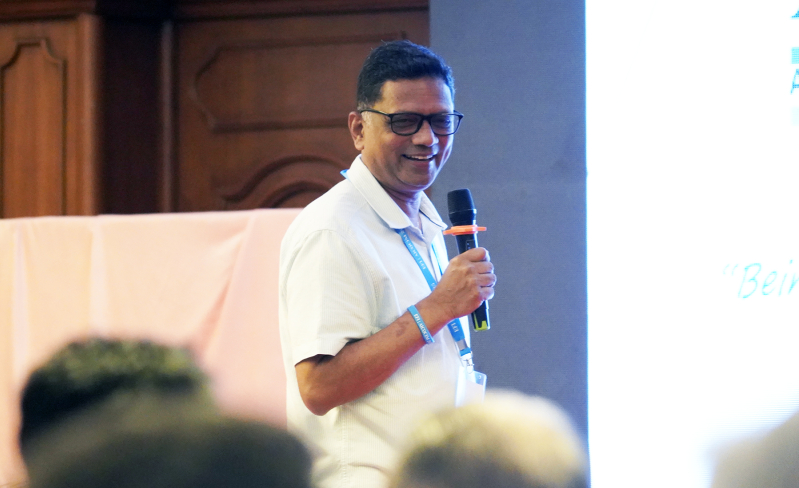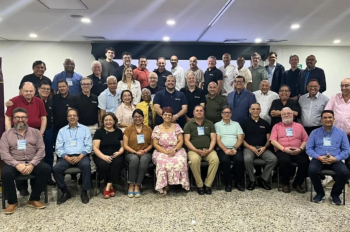
On the opening day of the All India Congress on Church in Mission (AICOCIM), Rev. Dr. Praveen Paul, Principal of Caleb Institute, delivered a plenary address urging the Indian Church to recover the essence of discipleship. He warned that consumer-driven attitudes and shallow models of church growth cannot sustain Christian witness, calling instead for the formation of authentic disciples shaped by integrity, humility, and Spirit-led obedience.
Paul framed his reflections around a personal question: Am I a disciple? After more than three decades of teaching and preaching, he acknowledged the temptation to assume that learning has reached its end. Yet, he reminded the gathering, the word “disciple” itself means “learner,” and that posture must remain at the heart of Christian life.
“Learning should never stop,” he said. “There has to be complete harmony between what we do, what we say, and what we think.”
Discipleship begins at home
Paul illustrated his point with a story from his years in pastoral ministry. After preaching a sermon on generosity at Hope Baptist Church in Bangalore, he was approached by a woman struggling to keep her business afloat and asked him for a loan.
Paul’s three children were present as she explained her need. He admitted that he hesitated, worried about his own limited resources at the time. But his son broke the silence: “Daddy, you preached about giving.” Confronted with the gap between his words and his actions, Paul realized that the moment had become a test of his own discipleship — and an opportunity to model it for his children.
Though he only got repaid part of the loan, Paul stressed that the real return was not financial but formative. His children saw him live out the generosity he had just preached. “If I am unable to disciple my children,” he told the Congress, “how will I disciple India?”
For Paul, discipleship begins not in church programs or mission strategies but in the daily integrity of life at home, where words and actions either align or contradict each other.
Relational and grace-filled discipleship
Paul emphasized that discipleship is relational, not theoretical. Jesus’ call to his disciples was not to a set of doctrines but to a living relationship with himself. It was because the disciples saw Jesus embody what he taught — praying, forgiving, and showing compassion — that they were willing to follow him even to death.
“You can’t theorize all the time,” Paul said. “Discipleship is relational, personal, and dynamic.”
He reminded leaders that discipleship is grounded in grace, not merit. Christians are saved by grace, and therefore their discipleship must be marked by humility, impartiality, and a willingness to serve all people without favoritism.
This, he suggested, is why neighbors and colleagues often form their impressions of Christianity not from books or sermons but from lived witness. “We have written enough,” Paul said. “We have published papers, produced movies, and distributed tracts. But what do our neighbors actually see in us?”
Transformation through presence and imitation
For Paul, discipleship is a process of transformation that comes through both hearing and seeing. Just as the first disciples learned by observing Jesus in prayer and compassion, so too today’s Christians are called to embody visible traits that others can imitate.
“Transformation is not a one-day process. It’s not like a car wash,” he said. “We must grow every day and be willing to learn.”
He challenged leaders to ask whether there are qualities in their lives that others would want to imitate. “I’m not saying we have to be perfect like angels,” he said, “but we must learn every day the traits of Jesus so that people can see them in us.”
Discipleship, Paul added, involves both learning and obedience. Recalling again the incident with the woman in need, he noted that although it was uncomfortable in the moment, acting in line with what he preached became a powerful lesson. “My doing will have a lasting impact on the life of my children,” he said.
Sevā: discipleship as selfless service
One of the central themes of Paul’s address was the concept of sevā, a Sanskrit term meaning “selfless and meaningful service.” He proposed that this word captures the biblical vision of discipleship more effectively than the commonly used term “mission.”
Paul presented SEVA as an acronym for Service, Empowerment, Vision, and Authority. This framework, he explained, redirects the Church away from accomplishment-driven understandings of mission toward humility and service motivated by love.
“Mission sometimes gives an understanding of going somewhere, doing something, accomplishing, and coming back,” Paul said. “But sevā is service and empowerment with the vision and authority of the Lord Jesus Christ.”
By reframing mission as sevā, Paul called for discipleship that resists consumerism and materialism, focusing instead on love expressed in action. “Obedience must be motivated by love,” he said, “not by showing off or seeking recognition.”
He tied this directly to Jesus’ love for his disciples, which led him to lay down his life in order to teach them the principles of God’s kingdom. Authentic discipleship, Paul insisted, is marked by this same self-giving spirit.
The cost and responsibility of discipleship
Quoting from James 1:22, Paul urged the assembly to be “doers of the word, and not hearers only.” He reminded them of Dietrich Bonhoeffer’s The Cost of Discipleship, which describes following Jesus as surrender and self-denial.
Discipleship, Paul said, cannot happen without renunciation and sacrifice. Citing Luke 9:23, he underlined the daily nature of this call: “If anyone would come after me, let him deny himself and take up his cross daily and follow me.” Likewise, Luke 14:33 teaches that unless one renounces all possessions, one cannot be a disciple.
“Your renunciation must be seen in your daily life,” Paul told the leaders. “It cannot be confined within the four walls of the church.”
He acknowledged candidly that self-denial is difficult. Yet he stressed that true discipleship must be visible in the ordinary practices of family and community life.
Challenging consumerism in worship
Paul critiqued the way some churches have encouraged a consumer mentality, where young people choose congregations based on the quality of music or facilities. “Praise and worship for many is only that half an hour or 40 minutes,” he observed.
He urged leaders to reorient church life away from entertainment and status-seeking. He warned against giving undue preference to wealthy or influential members while neglecting the poor and marginalized.
True multiplication of the church, he argued, must be guided by service, empowerment, vision, and authority — the same principles of sevā. “The Great Commission is for all people,” he said, “not only people of my region, my language, or my family.”
Paul emphasized that discipleship cannot be achieved through human strategies, programs, or skills alone. While preparation and education are necessary, they are not sufficient.
“You cannot make disciples by your singing or your skills,” he said. “You can make disciples only when you are empowered by the Spirit of God.”
He described his own dependence on God in preparation for the plenary, noting that true effectiveness requires fresh anointing each day. “My ministry experience counts as nothing, my education is nothing,” he said. “I want to be a new disciple today.”
Only through this Spirit-empowered life, Paul said, can discipleship have a lasting impact on individuals and communities.
Discipleship in community
Another major theme of Paul’s plenary was the communal dimension of discipleship. Jesus did not call isolated followers but formed a community of disciples who lived, learned, and served together.
Paul pointed to the African concept of ubuntu — “I am because we are” — as a reminder that discipleship cannot be reduced to individual achievement. “Sometimes we think, ‘I have reached this state because of what I did,’” he said. “But if you think like that, you are not learning.”
Mutual accountability, humility, and interdependence are therefore essential, he argued. Leaders must recognize that even their best efforts are incomplete without others, and all glory ultimately belongs to God.
Principles of authentic discipleship
In his conclusion, Paul outlined several principles he believes define authentic discipleship. It begins with a divine call to be part of the family of God and is sustained through continual communion with Christ. It combines learning with obedience and requires sacrificial commitment expressed in self-giving love. Authentic discipleship is marked by ministry oriented toward service — or sevā — and by community and accountability shaped through humility and interdependence. Above all, it depends on a Spirit-empowered life renewed each day by God.
“Discipleship is not about consumerism,” Paul said. “It is about becoming true disciples of Jesus Christ. Let others see Jesus in us.”
For Paul, the renewal of the Indian Church depends on moving away from shallow measures of success and returning to the costly but life-giving path of discipleship. While consumerism and materialism may draw crowds, he insisted, only authentic discipleship will sustain faith and transform society.
“We cannot be content with writing papers or organizing programs,” Paul told the assembly. “Discipleship must be lived daily in our families, our communities, and our churches. Only then will the Church fulfill its mission.”





